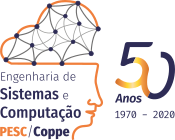Calendário de Eventos
|
O professor Luiz da Silva, em visita à UFRJ, proferirá uma palestra intitulada "Game Theory for Wireless Networks" (mais detalhes abaixo) na próxima quinta-feira, dia 27/07, às 10 horas, no bloco H do Centro de Tecnologia da UFRJ (a sala será informada em breve).
----------
GAME THEORY FOR WIRELESS NETWORKS
Abstract
Wireless systems have evolved towards great heterogeneity of radio access technologies, spectrum usage regimes, and ownership models. This kind of heterogeneity, combined with densification and greater autonomy for wireless devices, make game theory a powerful tool to model such systems. Game theory allows us to predict the outcomes of autonomous decisions by intelligent players (in our case, wireless devices), as well as to design resource usage etiquettes in wireless networks that will lead to desirable outcomes. In this tutorial, we will outline some ways in which cooperative and non-cooperative game theory can help us understand the complex interactions that will characterize future wireless networks. We will discuss the use of game theory in a variety of contexts, including dynamic sharing between incumbents and secondary users of spectrum, device-to-device communications, and resource sharing among mobile operators.
Bio
Luiz A. DaSilva holds the chair of Telecommunications at Trinity College Dublin, where he is a co-principal investigator of CONNECT, a telecommunications centre funded by the Science Foundation Ireland. Prior to joining Trinity College, Prof DaSilva was with the Bradley Department of Electrical and Computer Engineering at Virginia Tech for 16 years. His research focuses on distributed and adaptive resource management in wireless networks, and in particular radio resource sharing and the application of game theory to wireless networks. Prof DaSilva is a principal investigator on research projects funded by the National Science Foundation, the Science Foundation Ireland, and the European Commission. Prof DaSilva is a Fellow of Trinity College Dublin, an IEEE Communications Society Distinguished Lecturer (2015-2018) and a Fellow of the IEEE, for contributions to cognitive networks and to resource management in wireless networks.







